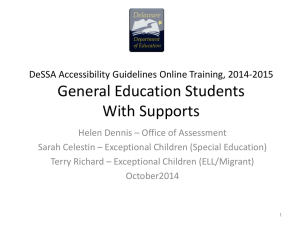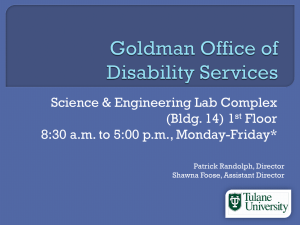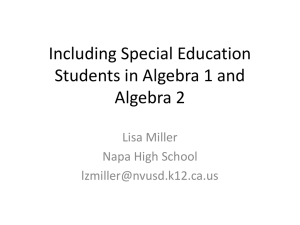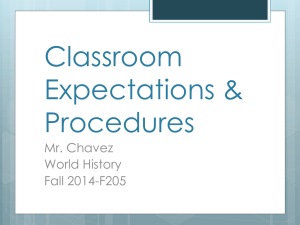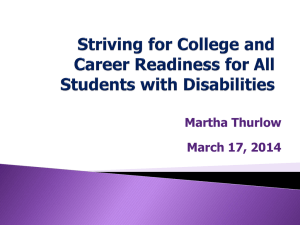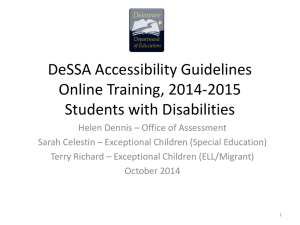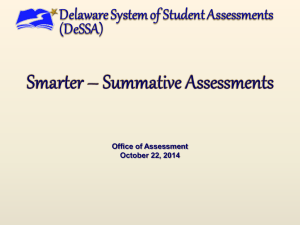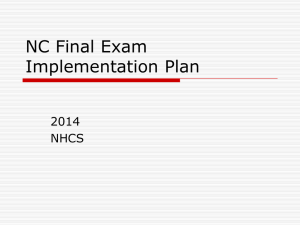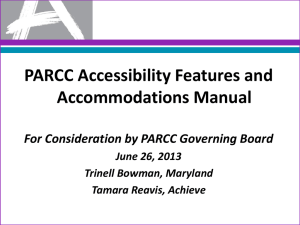Accessibility Guidelines Training - ELL
advertisement
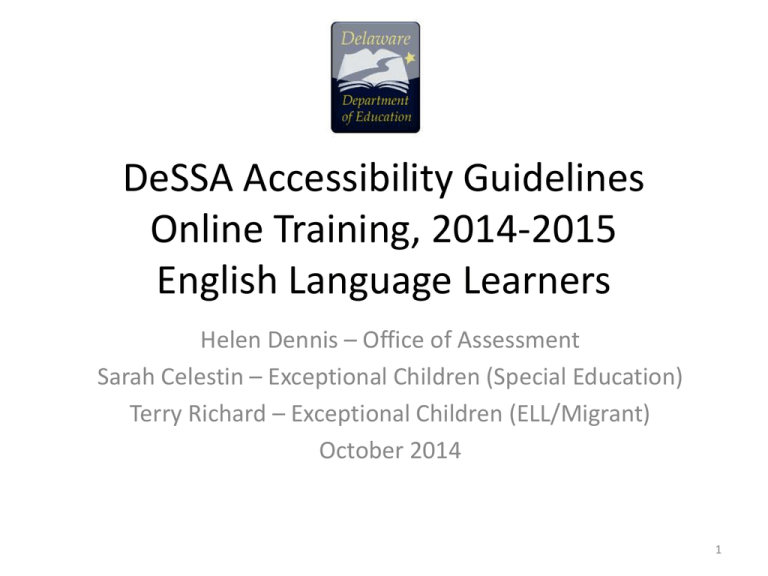
DeSSA Accessibility Guidelines Online Training, 2014-2015 English Language Learners Helen Dennis – Office of Assessment Sarah Celestin – Exceptional Children (Special Education) Terry Richard – Exceptional Children (ELL/Migrant) October 2014 1 Purpose of the Accessibility Guidelines Training Session Become familiar with: • Smarter Accommodations and Supports • DCAS Accommodations • DCAS ALT 1 Accommodations • Differences/similarities between DCAS/Smarter Accommodations • Policies, expectations, and timelines related to assessment accommodations and supports • Forms and Databases 2 DeSSA Accessibility Guidelines This document provides guidelines for making decisions about the inclusion in assessments of • students with disabilities (SWD), • English language learners (ELL), • students who are classified as both (SWD/ELL); • “General Ed Students With Supports,” (students not identified as SWD or ELL that may be provided supports during assessments) 3 What is DeSSA? • • • • Delaware System of Student Assessments • Includes Smarter, DCAS, DCAS ALT 1, SAT/PSAT, ACCESS/ALT ACCESS, NAEP 4 Assessments Covered by Guidelines • Smarter (ELA/Math) – Accommodations and Supports • DCAS (Science/Social) – Accommodations • High School End-of-Course (Math/History) – Accommodations • DCAS ALT-1 (ELA/Math/Science/Social) – Accommodations • ACCESS & ACCESS ALT (English Language Acquisition) – Accommodations 5 Different tests, different purpose, different accommodations DeSSA covers a variety of tests with a variety of purposes: • DCAS/Smarter – measures content knowledge/skills based on standards • DCAS—ALT 1– measures content knowledge/skills based on extended standards • ACCESS, ACCESS ALT – measure language proficiency • SAT/PSAT – measure college readiness Accommodations may change based on the purposes and the constructs of the tests. 6 Smarter • Content Areas: – ELA: Items measuring reading, listening, writing, research – Mathematics • Accommodations and Supports for SWDs • Supports for ELLs and Gen Ed students receiving supports • Universal tools for all 7 Smarter 8 What are Smarter “Designated Supports?” • Another name for an accessibility feature of the test that is available to selected groups – Available to more student-types than Smarter Accommodations • ELL, SWD, 504, Gen Ed – Might be called accommodations on another test (i.e. DCAS) – Might be called universal tools on another test – Include ELL related features 9 What are the Available Supports? Embedded • 3.01 Color contrast (onscreen) • 3.02 Masking • 3.03 Text-to-speech for items • 3.04 Translated test directions • 3.05 Translations (glossaries) • 3.06 Spanish Translations (stacked) • 3.07 Turn off any universal tools Non-Embedded • 4.01 Bilingual dictionary • 4.02 Color Contrast (printed) • 4.03 Color overlays • 4.04 Magnification • 4.05 Human Reader - items • 4.06 Scribe • 4.07 Separate Setting • 4.08 Translations (glossaries) • 4.09 Translated test directions • 4.10 Paper/Pencil • 4.11 Noise Buffers 10 What are Universal Tools? • Accessibility feature available to all students – No need to select prior to test – Student selects independently/spontaneously during the test • Smarter Balanced Module on Embedded Universal Tools and Online Features : – Narrated module: https://docs.google.com/file/d/0B9nrTDov_T0zaTUtLXhrY nRLZWs/edit?pli=1 – Non-narrated module: https://docs.google.com/file/d/0B9nrTDov_T0zcXAxQWs5 T29iZms/edit?pli=1 11 Smarter – DCAS Crosswalk http://www.doe.k12.de.us/assessment/files/Accoms_Crosswalk_DCAS12 SBAC.pdf Supports for Limited English Language Proficiency DCAS Science/Social Studies and EOC Math/History Smarter ELA/Math Text to Speech – Test Questions Available Available for ELA & Math (Including ELA PT passages). Human Reader – Test Questions Available Available for ELA & Math (including ELA PT passages). Text to Speech – Reading Passages Not Applicable Not Available* Human Reader – Reading Passages Not Applicable Not Available* * Except to ELLS with and IEP or 504 • We expect Smarter to announce that TTS to be available in Spanish for spring 2015. 13 Smarter Text-to-Speech/Human Reader for ELLs and Gen Ed with Supports Questions/Items Passages Grades 3-5 Available Not programmed Grades 6-8 Available Not Available* Grades 3-5 Available Not Available* Grades 6-8 Available Not Available* Embedded (TTS) Non-Embedded (Human Reader) *Unless student is also a student with an IEP or a 504 plan. Language Translation Supports DCAS Science/Social Studies and EOC Math/History Smarter ELA/Math Full Spanish Translation – Stacked (online) Available Available for Math only (not permitted for ELA) Full translation in Other Languages (besides Spanish) Human Interpreter/Translator Not available. Human Interpreter/Translator NOT PERMITTED. Print Glossary or word to word dictionary Permitted in Print. Selected Available from Smarter in by school. 10 languages. Use of nonsmarter-produced glossary not permitted. For MATH only. Translations (Glossaries) Not available Embedded. Online glossary or word-to-word dictionary Available for 10 languages with audio. For MATH only. 15 Translated Glossaries & Full Translations • Following languages are listed in the Smarter Accommodation & Supports “Frequently Asked Questions” Vietnamese Mandarin Arabic Korean Tagalog Punjabi Ilokano Russian Cantonese Ukrainian • Full translation for Spanish (“stacked” with English ) • Math only (not ELA) 16 Smarter Supports for ELL Students: Dictionaries When and to whom are dictionaries available? Embedded Bilingual (Translated) English only – gives meaning in English for an English word See “glossary, embedded, bilingual” (next slide) English Language Dictionary Category: Universal Tool Available to: Everyone Mode: Online Subject: ELA Performance Task Non-Embedded Bilingual Dictionary (Print) English Language Dictionary Category: Designated Support Available to: ELLs & identified others Mode: print Subject: ELA Performance Task Category: Universal Tool Available to: Everyone Mode: Online Subject: ELA Performance Task Smarter Supports for ELL Students: Glossaries Embedded (online) NonEmbedded (not online) Bilingual (Translated word to word, no definitions) English – gives meaning in English for an English word Bilingual Glossary Category: Designated Support Available to: ELLs & identified others Mode: Online Subject: Math English Glossary Category: Universal Tool Available to: Everyone Mode: Online Subject: Math and ELA How it Works: Translations for these terms appear on screen when students click on them. Students can also select the audio icon next to the glossary term and listen to the audio recording of the glossary. How it Works: Via pop-up window, grade and context-appropriate definitions of specific constructirrelevant terms are shown in English on the screen. Student can access the embedded glossary by clicking on any of the pre-selected terms. See Bilingual Dictionary (NonEmbedded) N/A DCAS • Science and Social Studies only • Same accommodation policy as previous years – Accommodations only (No Supports) – Formally identified students only • ELL (English language learners) • SWD (students with disabilities) • Universal design features for all 19 DCAS ALT-1 • Alternate test for students with significant cognitive disabilities • Reading, Math, Science, Social Studies • Participation Guidelines – Increasing number of ELLs documented with significant cognitive disabilities • 2014-15: For the first time, DOE will track some accommodations in the Assessment Accommodations Database • Test Characteristics Profile 20 Accommodations & Supports Timeline for General Assessments • When can I plan accommodations & supports? – Any time before the assessment. • When can I enter accommodations & supports? – Between test windows – during the planned test window, prior to testing – With 3 days prior to testing, (number specified in DeSSA Test Administrator Training) – Do not enter accommodations for 2015-16 before spring 2015 window closes (June 4). • When should the student start using the accommodation & supports? – In the classroom – as soon as it can benefit the student – On the test – • after the student becomes proficient in the accom or support • after it is showing in the TIDE database 21 Accommodations & Supports in Classroom and Assessment Classroom Accoms and Supports DCAS Accommodations and supports Smarter Accommodations & Supports 22 Accommodations Form 23 Accommodations Listings/Forms • Smarter Example 24 Recently-Arrived ELL/Immigrants • Recently arrived LEP student: an LEP student who has attended schools in the United States for less than 12 months. • During his/her first 12 months attending schools in the U.S., a State may exempt such a student from one administration of the State’s reading/language arts assessment. • For purposes of participation in a State's assessment system, recently arrived LEP students must take an English proficiency assessment – (no exemption from ACCESS, ALT ACCESS) ELL Exemptions From Smarter Reading or DCAS ALT 1 Reading • Accom 9.01 (from Smarter Reading) or Accom 901 (from DCAS ALT 1) • Student must be formally identified as ELL and immigrant • Student is Not enrolled in U.S. schools for a 90 day period or longer (excluding June, July, August). The 90 days must occur between Sept 1 – May 30 to qualify the student as immigrant. • Student is Not FEP • Student has been entered into ELL 2.0 by school • Student’s most recent immigration date has been entered into ELL 2.0 by school • Exemption lasts 12 months. • If student’s 12 months expires during the spring test window, then the student must test during the window. – It does not matter when the student tests in the window, as long as the student tests Accommodations for ELLS taking the Alternate Assessment DCAS ALT 1 27 DCA ALT 1 Accommodations Tracking Overview • • • • • • Substitution or Presentation of response cards Large Print Magnification ASL Braille & tactile graphics ELL-related accommodations – – – – Translator/interpreter items Translator/interpreter reading passages Translation of construct-irrelevant words Definition of construct-irrelevant words 28 Accommodations on the English Language Proficiency Assessments • ACCESS, ALT ACCESS • Refer to pages 59-68 of the DeSSA Accommodations forms. • Take the WIDA training in winter/spring • Select accommodations for SWD/ELLs on ACCESS with an understanding of the purpose of ACCESS test – NOT the same purpose as Smarter Reading and DCAS ALT-1 Reading. – Probably different accommodations selected for different purposes 29 Switching between General and Alternate Assessments • Document the decision to switch BEFORE the opening of the Spring Window • After you administer a spring test, it is too late to switch tests. 30 Technical 31 Assessment Accommodations Database • Access Via IMS • Contains Accommodations and Supports for – Students with Disabilities (IEP, 504) – ELLs – Gen Ed with Supports • Enter, List, or Report Accommodations and Supports • Data for AIR TIDE (Test Information Distribution Engine) is extracted from it Opening Screen (“Search” Screen) Students with IEP’s Search Results Screen Student-Related Reports Currently-DCAS only Report Results Screen Help! None of Our Reading Accommodations “Rolled Up” • Accommodations could not be rolled up from DCAS reading to Smarter ELA. They are too different. – The list of accommodations & supports are permitted; – The rules about who can have which accommodations & supports. • Schools must enter all Smarter ELA accommodations and supports. – Use the crosswalk from last spring’s field test – determine what accommodations and supports offered on Smarter ELA are similar to DCAS Reading Accommodations. • Schools must also enter all Smarter math accommodations and supports. – The only math accommodations in the system are DCAS math accommodations. – Math rolled up because High School End of Course Algebra II and Integrated Math III tests are still being offered. 37 Smarter Reset Policy • Different from previous DCAS Reset Policy • If student answered 6 or more items, no reset will be granted. – If the test was administered incorrectly (i.e., the wrong accommodations were provided), the test will be invalidated, and the student will not get another opportunity to test. • If the student answered fewer than 6 items, a reset can be granted. – If the test was administered incorrectly, the test reset will give you another chance to administer the test correctly. • DCAS/EOC will adopt the new Smarter reset policy. 38 AIR TIDE • In 2014-15, TIDE will contain all information related to – Smarter ELA/Math – DCAS Science/Social Studies – EOC Alg II/IM III, US History – DCAS ALT 1 ELA/Math/Science/Social Studies • Student will have one record in TIDE that has the info for all his/her tests 39 Paper/Pencil (incl. Braille p/p) • Support 4.10 • Available for Spring 2015 (not yet official) – Intended for schools nationally that do not have adequate internet access • Use of “Print on Demand” is preferred • Paper/Pencil flag in eSchool or add support in database for identified Gen Ed with Supports 40 Future Updates to 2014-15 Accessibility Guidelines • Additional updates and clarifications are likely between now and spring 2015 testing • Look out on DOE website and DCAS Portal – Updates memo – Updated Accommodations form • Expected future updates – Announcement regarding Spanish TTS • DOE Training on how to use the Assessment Accommodations Database • Smarter module on universal tools 41 Upcoming Training • Additional Accessibility Guidelines training for DCAS--ALT 1 coordinators and test administrators • DOE Training on how to use the Assessment Accommodations Database • Smarter module on universal tools • DCAS ALT 1 Online Update Training • DCAS ALT 1 Face to Face training for new TAs 42 Questions • Sarah Celestin – Students with Disabilities o 302-735-4210 o Sarah.Celestin@doe.k12.de.us • Terry Richard – English Language Learners o 302-735-4210 o Terry.Richard@doe.k12.de.us • Helen Dennis – Office of Assessment o 302-735-4090 o Helen.Dennis@doe.k12.de.us 43
